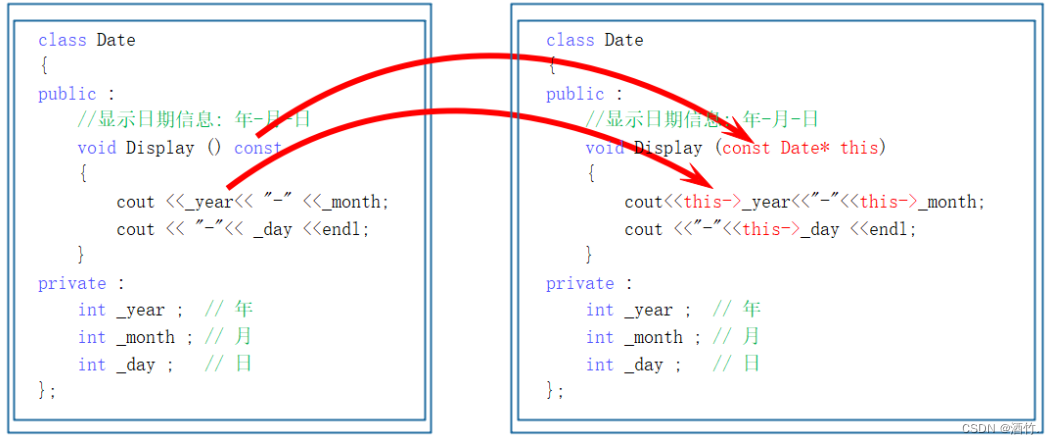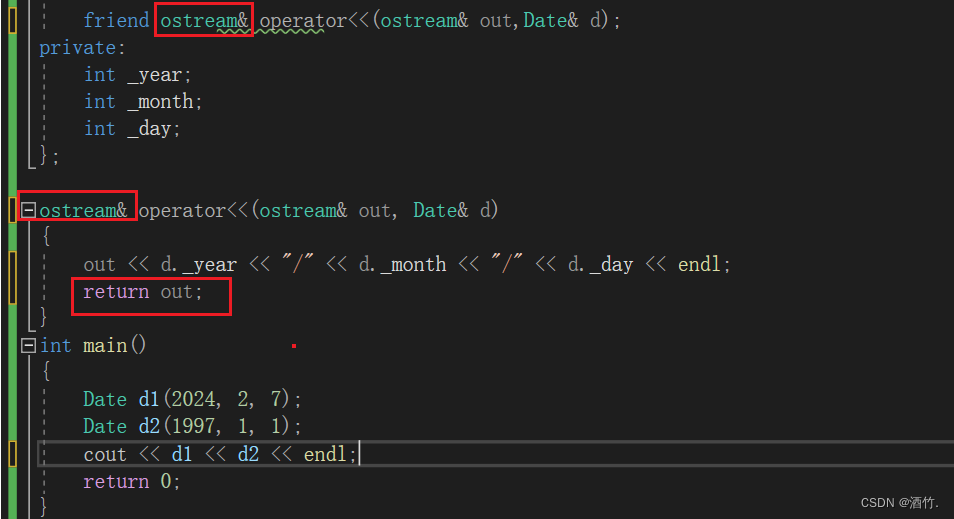本文主要是介绍c++阶梯之类与对象(中)< 续集 >,希望对大家解决编程问题提供一定的参考价值,需要的开发者们随着小编来一起学习吧!
前文:
c++阶梯之类与对象(上)-CSDN博客
c++阶梯之类与对象(中)-CSDN博客
前言:
在上文中,我们学习了类的六个默认成员函数之构造,析构与拷贝构造函数,接下来我们来看看剩下的默认成员函数。
目录
前文:
前言:
5. 赋值运算符重载
5.1 运算符重载
普通函数版
运算符重载版
5. 2 赋值运算符重载
1. 赋值运算符重载格式
2. 实例
注意:
5.3 特殊的运算符重载 前置++与后置++
6. Date类的实现(多功能)
Date.h
Date.cpp
main.cpp
补充知识:
7.const成员
8. 取地址及const取地址操作符重载
5. 赋值运算符重载
5.1 运算符重载
我们知道函数重载,那么运算符重载又是什么?
C++为了增强代码的可读性引入了运算符重载,运算符重载是具有特殊函数名的函数,也具有其
返回值类型,函数名字以及参数列表,其返回值类型与参数列表与普通的函数类似。
函数名字为:关键字operator后面接需要重载的运算符符号。
函数原型:返回值类型 operator操作符(参数列表)
注意:
< > 不能通过连接其他符号来创建新的操作符:比如operator@
< > 重载操作符必须有一个类类型参数
< > 用于内置类型的运算符,其含义不能改变,例如:内置的整型+,不 能改变其含义
< > 作为类成员函数重载时,其形参看起来比操作数数目少1,因为成员函数的第一个参数为隐藏的this
< > .* :: sizeof ?: . 注意以上5个运算符不能重载。这个经常在笔试选择题中出
现
我们可以这样认为,运算符重载就是给运算符赋予一个新的含义,<专为自定义类型而生> 不过默认并不会改变运算符的基本逻辑。
我们来看看他在实际中的应用,我们实现两个Date类对象比较,1.是否相等 2. 是否小于
普通函数版
我们可以看到,在这个版本里,代码编写者取名十分随意,那么当别人看到这段代码,内心的活动估计十分激昂。虽然在功能上很完美,但其代码却会让人抓耳挠腮。
class Date
{
public:Date(int year = 2024, int month = 2, int day = 6){_year = year;_month = month;_day = day;}//Data类拷贝构造,赋值重载,析构都不需要自己实现bool compare1(const Date& d) //DateEqual {return _year == d._year&& _month == d._month&& _day == d._day;}bool compare2(const Date& d)//DateLess{if (_year < d._year){return true;}else if (_year == d._year){if (_month < d._month){return true;}else if (_month == d._month){return _day < d._day;}}return false;}private:int _year;int _month;int _day;
};
int main()
{Date d1(2024, 2, 7);Date d2(1997, 1, 1);cout << d1.compare1(d2) << endl;cout << d1.compare2(d2) << endl;return 0;
}运算符重载版
这一版本的代码可读性大大增强,还免去了起名的麻烦,同时在调用函数的时候,自定义类型也可以像内置类型一样简单快捷的使用运算符。
class Date
{
public:Date(int year = 2024, int month = 2, int day = 6){_year = year;_month = month;_day = day;}//Data类拷贝构造,赋值重载,析构都不需要自己实现bool operator==(const Date& d){return _year == d._year&& _month == d._month&& _day == d._day;}bool operator<(const Date& d){if (_year < d._year){return true;}else if (_year == d._year){if (_month < d._month){return true;}else if (_month == d._month){return _day < d._day;}}return false;}private:int _year;int _month;int _day;
};
int main()
{Date d1(2024, 2, 7);Date d2(1997, 1, 1);return 0;
}int main()
{Date d1(2024, 2, 7);Date d2(1997, 1, 1);/*cout << d1.operator<(d2) << endl;cout << d1.operator==(d2) << endl;*/cout << (d1 < d2) << endl;//在编译器看来,等同于cout << d1.operator<(d2) << endl;cout << (d1 == d2) << endl;//在编译器看来,等同于cout << d1.operator==(d2) << endl;return 0;
}注意:因为 << 的运算符很高,因此在调用时需要加括号。
运算符重载并不会改变运算符的底层逻辑,因此对于双操作数运算符来说,左操作数就是函数的第一个参数,右操作数是第二个参数。
那么运算符重载能定义成全局的吗,是的可以,但是这样我们就不能访问类的私有成员。但将类成员公有化,如何保证封装性呢?
我们可以使用友元函数,或者定义成成员函数。
5. 2 赋值运算符重载
1. 赋值运算符重载格式
参数类型:const T&,传递引用可以提高传参效率
返回值类型:T&,返回引用可以提高返回的效率,有返回值目的是为了支持连续赋值
检测是否自己给自己赋值
返回*this :要复合连续赋值的含义
2. 实例
我们发现,所谓的赋值重载与之前学到的拷贝构造几乎是一个模子里刻出来的,既然他们一样,那我们还有必要学他吗?
这里有一个误区,他们的实现确实一样,但有一个不同点。
< > 拷贝构造是对并不存在的对象进行拷贝构造,既有拷贝又有构造;
< > 赋值重载是对已经存在的对象进行赋值(拷贝)。
class Date
{
public:Date(int year = 2024, int month = 2, int day = 6){_year = year;_month = month;_day = day;}Date(Date& d){_year = d._year;_month = d._month;_day = d._day;}bool operator==(const Date& d){return _year == d._year&& _month == d._month&& _day == d._day;}bool operator<(const Date& d){if (_year < d._year){return true;}else if (_year == d._year){if (_month < d._month){return true;}else if (_month == d._month){return _day < d._day;}}return false;}bool operator!=(const Date& d){return !(*this == d);}Date& operator=(const Date& d){if (*this != d){_year = d._year;_month = d._month;_day = d._day;}return *this;}private:int _year;int _month;int _day;
};int main()
{Date d1(2024, 2, 7);Date d2(1997, 1, 1);int a = 10;int b = 20;Date d3 = d1;//拷贝构造,即Date d3(d1);Date d4;d4 = d1;//赋值重载return 0;
}我们在汇编视角可以看的更加清晰。

注意:
赋值重载只能定义成类的成员函数,不能定义成全局函数。
< > 编译器不支持定义为全局函数,如果定义成全局会报错。
< > 定义成全局函数,那么类中没有实现,作为默认成员函数之一,编译器会自动生成一个默认赋值重载,那么当调用的时候就会产生冲突。
< > 用户没有显式实现时,编译器会生成一个默认赋值运算符重载,以值的方式逐字节拷贝。注意:内置类型成员变量是直接赋值的,而自定义类型成员变量需要调用对应类的赋值运算符重载完成赋值。
我们不写,编译器会自动生成,那么我们还需要写吗?
视情况而定,值拷贝对于Date类来说很适用,那么对于我们之前写的Stack类呢?他会造成不小的麻烦 。关于这一点,在c++阶梯之类与对象(中)-CSDN博客中的拷贝构造函数一节有详细讲解,感兴趣的宝子可以去看看。
5.3 特殊的运算符重载 前置++与后置++
前置++和后置++都是一元运算符,为了让前置++与后置++形成能正确重载
C++规定:后置++重载时多增加一个int类型的参数,但调用函数时该参数不用传递,编译器
自动传递
Date operator++(int)//后置++,后置++使用后加1,因此返回的结果是自己本身,返回之后自身+1
{Date tmp = *this;_day+=1;return tmp;
}Date& operator++()//前置++,前置++使用前++,前置++返回的结果是自身+1
{_day++;return *this;
}
6. Date类的实现(多功能)
在Date类实现常用运算符的重载,日期计算器,两日期的间隔等功能。
Date.h
#include<iostream>
using namespace std;
class Date
{
public:// 获取某年某月的天数int GetMonthDay(int year, int month);// 全缺省的构造函数Date(int year , int month , int day );// 拷贝构造函数Date(const Date& d);// 赋值运算符重载Date& operator=(const Date& d);// 析构函数~Date();// 日期+=天数Date& operator+=(int day);// 日期+天数Date operator+(int day);// 日期-天数Date operator-(int day);// 日期-=天数Date& operator-=(int day);// 前置++Date& operator++();// 后置++Date operator++(int);// 后置--Date operator--(int);// 前置--Date& operator--();// >运算符重载bool operator>(const Date& d);// ==运算符重载bool operator==(const Date& d);// >=运算符重载bool operator >= (const Date& d);// <运算符重载bool operator < (const Date& d);// <=运算符重载bool operator <= (const Date& d);// !=运算符重载bool operator != (const Date& d);// 日期-日期 返回天数int operator-(const Date& d);//打印void Print();private:int _year;int _month;int _day;};Date.cpp
#include"Date.h"
//获取每个月的天数
int Date::GetMonthDay(int year, int month)
{int monthDays[13] = { 0,31,28,31,30,31,30,31,31,30,31,30,31 };if ((month == 2) && ((year % 4 == 0 && year % 100 != 0) || year % 400 == 0)){return 29;}return monthDays[month];
}
//全缺省构造函数
Date::Date(int year = 1997, int month = 1, int day = 1)
{_year = year;_month = month;_day = day;
}//拷贝构造
Date::Date(const Date& d)
{_year = d._year;_month = d._month;_day = d._day;
}//赋值运算符重载
Date& Date::operator=(const Date& d)
{if (*this != d){_year = d._year;_month = d._month;_day = d._day;}return *this;
}//析构
Date::~Date()
{;
}//日期+=天数
Date& Date::operator+=(int day)
{_day += day;while (_day > GetMonthDay(_year, _month)){_day -= GetMonthDay(_year, _month);_month++;if (_month == 13){_year++;_month = 1;}}return *this;
}//日期+天数
Date Date::operator+(int day)
{Date tmp = *this;tmp += day;return tmp;
}//日期-=天数
Date& Date::operator-=(int day)
{_day -= day;while (_day <= 0){_day += GetMonthDay(_year, _month);_month--;if (_month == 0){_year--;_month = 12;}}return *this;
}//日期-天数
Date Date::operator-(int day)
{Date tmp = *this;//拷贝构造tmp -= day;return tmp;}//后置++
Date Date::operator++(int)//后置++,后置++使用后加1,因此返回的结果是自己本身,返回之后自身+1
{Date tmp = *this;_day++;return tmp;
}//前置++
Date& Date::operator++()//前置++,前置++使用前++,前置++返回的结果是自身+1
{_day++;return *this;
}//后置--
Date Date::operator--(int)
{Date tmp = *this;_day --;return tmp;
}//前置--
Date& Date::operator--()
{_day--;return *this;
}//重载==
bool Date::operator==(const Date& d)
{return _year == d._year&& _month == d._month&& _day == d._day;
}//重载!=
bool Date::operator!=(const Date& d)
{return !(*this == d);
}//重载<
bool Date::operator<(const Date& d)
{if (_year < d._year){return true;}else if (_year == d._year){if (_month < d._month){return true;}else if (_month == d._month){return _day < d._day;}}return false;
}//重载<=
bool Date::operator<=(const Date& d)
{return (*this < d) || (*this == d);
}//重载>
bool Date::operator>(const Date& d)
{return !(*this <= d);
}//重载>=
bool Date::operator>=(const Date& d)
{return !(*this < d);
}//日期-日期=天数
int Date::operator-(const Date& d)
{Date max = *this, min = d;int flag = 1;if (*this < d){max = d;min = *this;flag = -1;}int n = 0;while (min != max){min += 1;n++;}return n * flag;
}//打印
void Date::Print()
{cout << _year << "/" << _month << "/" << _day << endl;
}
main.cpp
#include"Date.h"int main()
{Date d1(2024, 2, 7);Date d2(1997, 5, 3);cout << (d1 - d2) << endl;d1 -= 10;d1.Print();d2 += 20;d2.Print();cout << (d1 < d2) << endl;Date d3(1, 1, 1);d1.Print();d3 = d1++;d3.Print();++d3;d3.Print();return 0;
}Date的实现是对近期知识的总结,糅合了许多语法,并且难度也不大,值得一写。
补充知识:
补充上述相关的简略友元与操作数顺序知识。 这里使用重载流插入操作符<< 来进行演示。
我们根据所学的知识写了 << 的重载成员函数,但在使用的时候出现了问题。
我们之前说过, 运算符重载并不会改变运算符的底层逻辑,因此对于双操作数运算符来说,左操作数就是函数的第一个参数,右操作数是第二个参数。
因此按我们写的,应该这么使用
但很显然,这与我们预期的不符。成员函数隐含形参this,这个我们没有办法更改,因此只能将他实现为全局函数,然后更改函数参数的顺序。这里会用到友元,现在我们只需要知道友元的存在,不必深究。
虽然此时可以使用 << 输出Date类型了,但他只能输出一个,正常的 << 是可以连续流插入的。
这里的问题在于运算符的结合性,<< 是从左往右,cout<<d1 之后需要返回一个值,然后再调用 << 。我们做如下更改,
此时的流插入操作符重载和我们心目中的就一般无二了。
7.const成员
将const修饰的“成员函数”称之为const成员函数,const修饰类成员函数,实际修饰该成员函数隐含的this指针,表明在该成员函数中不能对类的任何成员进行修改。

我们知道,成员函数中隐含的参数this指针是不允许显式写出来的,因此我们要将this指针const化就只能通过上面的方法。
请思考下面的几个问题:
1. const对象可以调用非const成员函数吗?
2. 非const对象可以调用const成员函数吗?
3. const成员函数内可以调用其它的非const成员函数吗?
4. 非const成员函数内可以调用其它的const成员函数吗?
8. 取地址及const取地址操作符重载
这两个默认成员函数一般不用重新定义 ,编译器默认会生成。
class Date
{
public :
Date* operator&()
{
return this ;
}
const Date* operator&()const
{
return this ;
}
private :
int _year ; // 年
int _month ; // 月
int _day ; // 日
};这两个运算符一般不需要重载,使用编译器生成的默认取地址的重载即可,只有特殊情况,才需
要重载,比如想让别人获取到指定的内容!
这篇关于c++阶梯之类与对象(中)< 续集 >的文章就介绍到这儿,希望我们推荐的文章对编程师们有所帮助!










